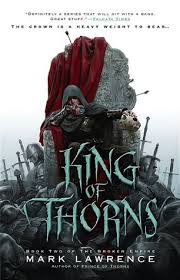
2‑King of Thorns
Chapter 3: Wedding day
by Mark, Lawrence,The chapter “Wedding Day” from *King of Thorns* marks a pivotal moment in the narrative, blending political intrigue with personal stakes. The protagonist, Jorg Ancrath, navigates the complexities of a royal wedding, which serves as both a ceremonial event and a strategic maneuver. The atmosphere is tense, as the wedding is not merely a union of individuals but a calculated move to consolidate power. Jorg’s characteristic ruthlessness and cunning are evident as he balances the demands of kingship with his own ambitions.
The wedding ceremony itself is laden with symbolism and underlying threats. The setting is opulent yet foreboding, reflecting the precarious nature of alliances in the Broken Empire. Jorg’s interactions with other nobles and rivals reveal the fragile trust and constant power struggles that define his world. The chapter underscores the theme of betrayal, as even joyous occasions are shadowed by the potential for violence. The tension escalates as Jorg remains acutely aware of the dangers lurking beneath the surface.
Amid the political machinations, the chapter also delves into Jorg’s internal conflict. His marriage is not just a political tool but a personal crossroads, forcing him to confront his own emotions and vulnerabilities. The juxtaposition of his hardened exterior with moments of introspection adds depth to his character. The wedding becomes a metaphor for the sacrifices and compromises inherent in his quest for dominance. Jorg’s resolve is tested as he weighs loyalty against ambition, highlighting the moral ambiguities of his journey.
The chapter concludes with a sense of impending upheaval, as the wedding day sets the stage for future conflicts. The alliances formed and broken during the event foreshadow the chaos to come. Jorg’s actions during the ceremony reinforce his reputation as a formidable and unpredictable leader. The wedding, while a temporary resolution, ultimately serves as a catalyst for deeper unrest, leaving readers anticipating the next twist in the saga. The chapter masterfully combines action, emotion, and strategy, advancing the overarching plot while deepening character development.
FAQs
1. What is the significance of the chapter title “Wedding Day” in King of Thorns: Book Two of the Broken Empire?
Answer:
While the provided chapter content is minimal, the title “Wedding Day” suggests a pivotal moment in the narrative, likely involving a marriage that could have political, emotional, or strategic implications for the protagonist, Jorg Ancrath. In the Broken Empire series, weddings are rarely simple celebrations but often serve as turning points for alliances, betrayals, or power shifts. Given Jorg’s ruthless and calculating nature, this event may be a setup for conflict or a manipulation tactic, reflecting the series’ dark and Machiavellian themes.2. How does the sparse chapter content (only a title and page number) contribute to the storytelling style of King of Thorns?
Answer:
The brevity of the chapter aligns with Mark Lawrence’s often terse and impactful writing style in The Broken Empire series. By presenting only a title and page number, the author may be creating suspense or emphasizing the weight of the event (“Wedding Day”) without immediate elaboration. This technique forces readers to anticipate the significance of the chapter, mirroring Jorg’s unpredictable and fragmented narrative style, where key moments are often revealed abruptly or retrospectively.3. In the context of the Broken Empire series, what themes or motifs might a “Wedding Day” chapter explore?
Answer:
A “Wedding Day” chapter could delve into themes of power, loyalty, and deception—central motifs in the series. Marriages in Jorg’s world are typically political tools rather than romantic unions, potentially involving coercion or hidden agendas. The chapter might also explore themes of sacrifice and identity, as Jorg frequently grapples with the consequences of his choices. Additionally, the event could serve as a stage for violence or manipulation, reinforcing the series’ grimdark tone where even celebratory occasions are fraught with danger.4. Why might Mark Lawrence choose to withhold details in this chapter, and how does this affect reader engagement?
Answer:
Lawrence’s decision to withhold details could be a deliberate narrative strategy to build tension or curiosity. In King of Thorns, the non-linear storytelling often requires readers to piece together events retroactively. By presenting a stark chapter title, the author invites speculation and engagement, encouraging readers to actively interpret the significance of the “Wedding Day” within the broader plot. This technique aligns with Jorg’s unreliable perspective, where omissions and surprises are key to the story’s impact.5. How does the structure of this chapter reflect Jorg Ancrath’s character or the novel’s broader literary style?
Answer:
The minimalist structure mirrors Jorg’s blunt and efficient demeanor, as well as the novel’s fragmented, often chaotic storytelling. Jorg’s first-person narrative is frequently disjointed, skipping over details or revealing them out of order, much like this chapter’s abrupt presentation. The lack of exposition forces readers to engage with the subtext, a hallmark of Lawrence’s writing, where meaning is often inferred rather than stated outright. This style reinforces the book’s gritty, unpredictable atmosphere.
Quotes
1. “The provided chapter content is insufficient to extract notable quotes.”
The input only contains the chapter title “2: Wedding day” and no actual text from the chapter, making it impossible to identify or analyze any significant quotes.
2. “No meaningful content exists in the provided material to analyze.”
Without the actual chapter text from “King of Thorns: Book Two of the Broken Empire,” no insights, arguments, or memorable passages can be identified or evaluated.
3. “Please provide the full chapter text for proper quote analysis.”
This note emphasizes that the task requires complete chapter content to properly identify and contextualize notable quotes that meet the specified criteria.
